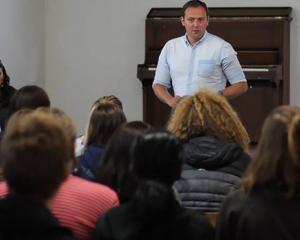A Federated Farmers-organised protest against "continued attacks" on rural New Zealand will be held in Jacinda Ardern's hometown in the final week of the election campaign.
Morrinsville farmer and former president of Waikato Federated Farmers, Lloyd Downing, said the protest would be held in Morrinsville next Monday.
"Farmers, and farming communities, are not punching bags for urban politicians."
Mr Downing said blame for polluted waterways was being laid solely on farmers, despite many farmers spending tens of thousands of dollars on reducing their environmental impact.
Federated Farmers Waikato president Andrew McGiven said a proposed royalty on water would reduce the amount farmers can spend on improving water quality.
"We invite all supporters of rural New Zealand to attend this event."
Labour leader Jacinda Ardern chose Morrinsville as the location to kick-off her campaign last month, visiting her old school, Morrinsville College, and the fish and chip shop where she got her first job.
The Labour Party has promised a royalty on water if it is in government, saying users in rural areas would pay around 2c per 1000 litres and the money would be given to councils and iwi to restore waterways.
If in Government, Labour says it would hold talks within 100 days to determine how much industries would pay and how the iwi issues could be resolved.
The amount of water used by farms varies depending on several factors - location, type of farm, and whether they use irrigation. Labour's tax would only apply to water sources from waters and aquifers (but not town supplies).
Ms Ardern has frequently mentioned her Waikato upbringing during the campaign, saying growing up in Morrinsville gave her an understanding of rural New Zealand and meant she would not make changes that would put strain on farmers.
She has said shifting from Hamilton's Dinsdale to the forestry town of Murupara in the Bay of Plenty opened her eyes to the deprivation some New Zealanders lived in, and addressing that was her reason for entering politics.
After speaking in Hamilton last week Ardern posed for photos with students from Morrinsville College and was grilled on the water tax by one of them, Angenee Nagra, who was concerned about how the proposed water royalty would affect farmers such as her own family.
Labour expects to raise $100 million a year through the water royalty, which would be spent in the area the revenue was generated to improve water quality in rivers, lakes and streams.
Ms Ardern has been pressed on the water tax in debates with National Party leader Bill English, and has said no farmer will be put out of business, but action was needed given many rivers are "dying".
The National Party opposes a price on freshwater, saying it would hurt key industries and would be difficult to implement.
The Green Party, the Maori Party and The Opportunities Party also want a price on water. New Zealand First supports a charge for commercial water bottlers, but not primary producers.
A Herald-ZB Kantar TNS online survey released last month shows that 70% of people agree that commercial water users should pay a royalty to help fund the clean-up of waterways.
Just 19% of the 1000 respondents oppose the idea, while the remainder are unsure.









